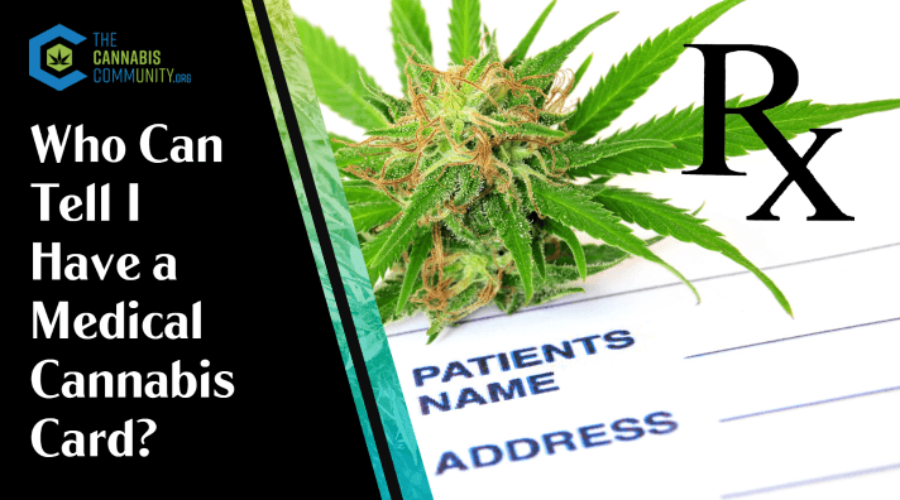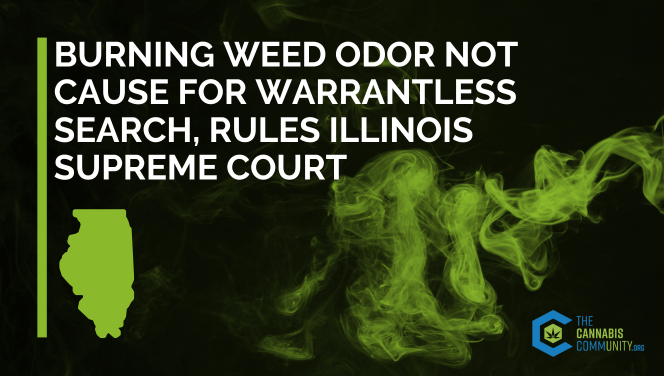Who Can See That I Have a Medical Cannabis Card?
Table of Contents
From cancer to Tourette syndrome (TS), marijuana is proving to be an effective treatment for a variety of chronic health disorders. As a result, medical marijuana is currently allowed in 38 states, including D.C., with qualifying patients receiving state-issued medical marijuana cards based on a doctor’s recommendation. Despite its widespread use, medical marijuana legislation and the ramifications of obtaining a medical marijuana license are frequently misunderstood.
Marijuana is still illegal under federal law. This means anyone disclosing information about their marijuana use could be subject to prosecution. Patients expect their medical marijuana records to be kept confidential, just like any other medical data, to protect their personal information and medical history.
Luckily, there are steps you can take to protect your personal information. This article will discuss who can access your medical marijuana records and how you can keep them private.
Is My Medical Marijuana Record Protected?
Yes. Thanks to HIPAA regulations, you can trust that your medical information will be protected. The Health Insurance Portability and Accountability Act (HIPAA) is a law that includes security and data privacy provisions to protect patients’ healthcare-related and medical information in the United States.
HIPAA is a federal law signed by President Bill Clinton on Aug. 21, 1996, which mandated the adoption of national standards to prevent sensitive patient health information from being revealed without the patient’s consent or knowledge. HIPAA has two main goals:
- offer continuous health insurance coverage for employees who leave or change jobs
- lower healthcare costs by standardizing the electronic transmission of administrative and financial activities.
Combating misuse, fraud, and waste in health insurance and healthcare delivery and enhancing access to long-term care services and health insurance are among the other objectives.
The HIPAA Privacy Rule
The HIPAA Privacy Rule is the first national policy in the US to secure patients’ personal or protected health information. It aims to preserve patients’ privacy by requiring doctors to submit a list of all entities to whom they disclose patient information(for billing and administrative purposes) while still allowing necessary health information to flow via the proper channels.
The Privacy Rule is applied to the following individuals and organizations, which are deemed covered entities:
- Healthcare Providers – Every healthcare professional, regardless of practice size, electronically communicates health information in connection with specific transactions.
- Health Plans – Organizations that offer or pay for medical treatment.
- Healthcare Clearinghouses – Entities that convert nonstandard information received from another entity into a standard or data content, or vice versa. Examples include a billing service, repricing company, and community health management information system.
- Business Associates – A person or organization who performs or provides activities or services for a covered entity by using or disclosing personal identifiable health information.
The Privacy Rule also protects people’s rights to know and choose how their health information is used. The primary goal of the Privacy Rule is to guarantee that individuals’ health information is effectively protected while allowing the flow of health information required to deliver and promote high-quality treatment and maintain the public’s health and wellbeing.
Is a Medical Cannabis Card Viewed in a Background Check?
No, it is not. Background checks will not reveal that you were granted a medical marijuana card. HIPAA still protects this information because technically, your state-issued card can only be obtained with a doctor’s medical recommendation.
Though HIPAA may keep the status of your consumption private, it’s vital to note that the state-issued card is not. Despite this, state officials cannot obtain or transmit that information to employers. There is no way to access the data without permission, and your personal information, such as your social security number, is not included. That means when you go to a dispensary, they can only check to see if your card is genuine — they can’t view anything more about your health or personal information.
Is a Medical Card Included in a Federal Background Check?
Technically, simply having a medical marijuana card will not appear on a federal background check. However, this does not rule out the possibility of your marijuana use being detected.
Your criminal record will show up in a federal background check, so if you’ve been convicted of marijuana possession, even if you were using it for medical reasons, you may find it difficult to obtain work. While a medical cannabis card will not appear on a federal background check, if you’ve had any run-ins with the law related to marijuana usage and/or possession (even if it was medical), you may still face issues if your criminal background check is run.
Keep in mind that federal and state laws are very different. Marijuana is still prohibited in the United States. As a result, federal government employees are required to follow federal regulations. Because federal regulations oversee drug-free workplace policies, a federal contractor may conduct a drug test on the job. If they do, there could be legal implications for you.
Can Employers Access Medical Marijuana Records?
No, they can’t. Your employer will never be able to access that type of sensitive information. Nor will it be accessible to a future landlord or a bank lender. Even if you utilize the company’s doctor and the information is revealed in your medical report, the doctor is not allowed to share the information with your employer.
Your information is secure, but it’s up to you to exercise caution and keep your cannabis use hidden if you’re nervous about your current or future employers discovering it.
Cannabis Laws on Employment
Medical marijuana laws currently exist in around three-fourths of states, allowing those with significant medical ailments to consume marijuana with a doctor’s permission. However, just because marijuana is legal in many places does not mean it is permitted in the workplace. Employers can terminate, punish, or take other disciplinary action against an employee who uses marijuana at work or shows up to work. In contrast, under the influence of marijuana in most states, even if the individual requires it to cure a medical condition.
Several states have laws prohibiting employers from discriminating against medicinal marijuana cardholders or terminating employees who test positive for marijuana. Some of these states additionally require employers to fairly accommodate an employee who requires medicinal marijuana to treat a medical condition, such as enabling an employee to start work later in the morning because she uses medical marijuana to treat glaucoma at night. Most states that have legalized medical or recreational marijuana leave testing decisions at the discretion of the individual employer.
According to the National Conference of State Legislators (NCSL), employers can’t take medical cannabis use or positive drug test results into account when making hiring and firing decisions, provided that employees do not bring their medical cannabis to work, are not working in a job that could cause serious harm to others, or are not working in a federally related position.
Ways to Protect Your Personal Health Information
Medical Cannabis Cards Shouldn’t Include Your Personal Information
Personal information such as your name, address, or social security number should not be included in a state’s medical cannabis card application system. However, it provides a unique user ID number and the card’s validity information. The medical cannabis card should only include the issue and expiration dates, a passport-style photo, your number, and the state’s name.
Obtain a Copy of Your Medical Records
You have the right to a copy of your medical records at any time under HIPAA. Examine your records once you’ve received them. You can learn what information is contained in your medical records by reviewing them. This is also a good time to double-check the accuracy of your medical records, which is important for future care.
Be Discreet
Even in states where cannabis is recreationally allowed, you can’t flaunt your use because it’s federally outlawed. Most employers will run a fast search engine query to learn more about you before conducting a background check. It’s common sense not to advertise your marijuana use on social media, for example. This means no photos of you smoking blunt or discussing marijuana on social media sites like Facebook or Twitter.
Visit a Dispensary That Is Far From Your Workplace
Otherwise, you risk being seen entering a dispensary by a company employee. Many consumers are winning lawsuits against businesses that discriminate against their medical marijuana use. If you like it that way, you could have a case but don’t bank on it.
Do Your Own Background Check
With so many trustworthy online background check services, it’s never been easier to be ahead of your employer by conducting your background assessment. Periodic personal background checks will also keep your personal and professional public profiles up to date.
Stay Informed
Be aware even if medicinal marijuana is legal in many jurisdictions and several states are still taking steps toward decriminalization. While your health data will be padlocked from anyone on the outside looking in, it is your job as a cannabis consumer to keep your consumption hidden. Use prudence, common sense, and remain current on your state’s legislative changes.
Enjoyed This Content? Read More:
-
How to Make Cannabis-Infused Coconut Oil or MCT Oil: Crockpot Recipes
In this guide, you’ll learn how to make cannabis-infused coconut oil or MCT oil, decarboxylate cannabis, or choose to infuse cannabis into any oil of your choice.
-
How to Make THC Gummy Bears with Canna Oil
This is a great no-fail recipe for beginners. The corn syrup in this recipe will help your gummy bears have that nice and chewy texture we’ve all come to love.
-
Cannabis Vape Hardware Guide for Pros: What You Need to Know
Expert tips to elevate your vaping experience. Explore the latest innovations to get the most satisfaction from your favorite cannabis vape hardware device.
-
Growing Your First Cannabis Plants: A Beginner’s Journey with Cannabiz Seed
Growing your first cannabis plants can be one of the most rewarding hobbies – but if you’re a beginner, it can also feel a bit intimidating. Don’t worry! Every expert grower started right where you are now. In fact, the founders of Cannabiz Seed began as home growers who faced all the classic newbie frustrations,…
-
Burning Weed Odor Not Cause for Warrantless Search, Rules Illinois Supreme Court
A Landmark Case for IL Medical Cannabis Patient Protections On September 9th, the Illinois Supreme Court issued a major victory for cannabis consumers and patients, declaring that the aroma of burnt cannabis is insufficient probable cause for a warrantless search. Illinois has long been at the forefront of the fight for plant medicine. Medical patients…









 Sign up to get your medical card
Sign up to get your medical card
Jordan Kane
September 23, 2024 at 12:05 pmI have heard that since a medical card is given in a state level and hippa is a federally funded program that it does not protect the acknowledgement of a card on record. While the illness and details of are protected by hippa, having the card is not since it isn’t federally regulated. Is that true?